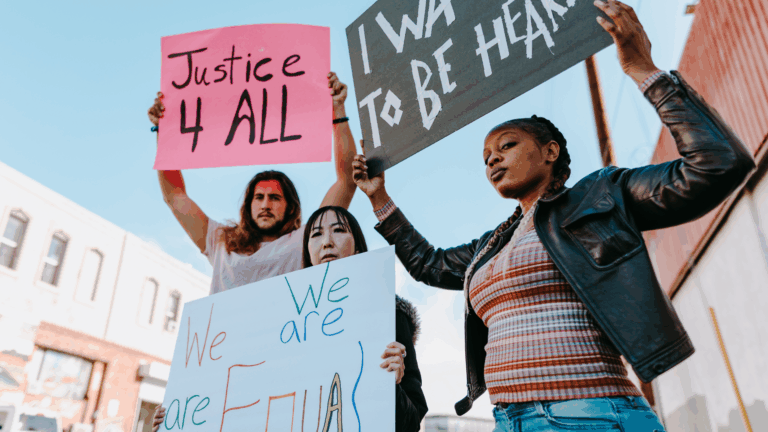Originally posted at Anglican Compass.
In the face of senseless suffering, it’s easy to doubt that God exists. Family is a sacrament that could make all the difference. But what happens when someone lacks the sacrament of family?
Whether in the form of a miscarriage, suicide, divorce, terminal illness, sexual abuse, job loss, or the slow revelation of the everyday brokenness that cohabitates each of our lives, senseless suffering haunts us. How could a good God allow this to happen? Where are His power and mercy? Is this world really just a god-less, chaotic mess?
But for most, they can turn to a family for comfort. Despite the senseless suffering, the love found in that family is too good and too beautiful to be random. Maybe there actually is a God? Maybe I can keep believing, even in the midst of painful doubt.
But what happens when single people don’t have that family to turn to?
A 2017 study found that single people were less likely to rebound from doubt and more likely to lose their faith. While 65% of Christians have doubted for some period of time, the most common response is for Christians to seek comfort from their families. Yet without this safety and solidarity in the home, single adults are twice as likely to lose their faith in the face of serious doubt.
This shouldn’t surprise us.
Family is a sacrament.
Although it’s not normally included in lists of two or seven sacraments, I argue that family is a sacrament—an ordinary thing God uses to reveal the mysteries of himself to us in tangible, undeniable ways. Even though it doesn’t have a specific rite or ceremony, family is an “outward and visible sign of an inward and spiritual grace” (ACNA Catechism, To Be A Christian, Q121). Even if you’re not willing to include “family” in an official list of sacraments, my main point is that family is sacramental.
But when I say family, I don’t just mean married people and kids. In Matthew 12:46-50, Jesus subverts our understanding of family, rejecting familial ties based solely on biology and instead establishing that Christian family is bound by the blood of Christ:
“While he was still speaking to the crowds, his mother and his brothers were standing outside, wanting to speak to him. Someone told him, ‘Look, your mother and your brothers are standing outside, wanting to speak to you.’ But to the one who had told him this, Jesus replied, ‘Who is my mother, and who are my brothers?’ And pointing to his disciples, he said, ‘Here are my mother and my brothers! For whoever does the will of my Father in heaven is my brother and sister and mother.’”
Jesus defines Christian family as a small community of Christians who live life together and embody the gospel for each other. From the beginning, families made up of God’s children were intended to imitate the love within the Trinity* and between God and His people: to bear the image of that love.
The love found in families was intended to be intimate, faithful, sacrificial, diverse, live-giving, and hospitable, embodying God’s love in beautiful ways. A family that bears that image serves as a tangible provision from God—a real presence of God’s love—that makes it easier to believe that a God who loves in those ways exists.
This is why those who find themselves without family are so vulnerable.
When the storm of life throws them overboard, there’s no one to pull them out and have faith for them when they have no faith themselves. They can’t endure by their own strength, and they lack a true embodiment of the body of Christ to be strong for them. When the fog of spiritual warfare makes it even more difficult to perceive a God we cannot see or touch or hear directly, those without family are left blind to stumble and fall.
Why not just reach out to a parent or sibling? Or connect with someone from church? Lean on a friend? Talk to your pastor?
These resources can be helpful, no doubt. But their comfort often isn’t enough. It can’t reach deep enough into the soul of a single person. Over years of singleness, those Christians have learned to numb the pain of loneliness, but at a cost: they’ve inadvertently become numb to the comfort of family as well.
As young single adults, we challenged ourselves to learn to depend on friends and extended family in healthy ways. But when friends and family got married, got new jobs, moved away, or just drifted apart in the absence of commitment, the family single people had was ripped away. Yet that is not family. True family seeks to imitate the faithful love of God. A tribe that abandons us is not family.
Eventually, they grow tired of the constant pain of loss and labor of replacing lost family, so single people decide it’s safer, less painful to just learn how not to need family. But no humans can truly learn how to not feel the pain of loneliness—we can only deaden the part of our soul that needs family. But this also means that when people who are loosely committed to us offer comfort in times of doubt, the comfort merely collects on the surface like rain on a rain jacket.
Christian women are most numerously affected by this poverty of the sacrament of family. A 2018 study found that there are 50% more single women than single men in the Church. Because of the fewer number of faithful men in the Church, many single women involuntarily continue in singleness because the numbers just aren’t there. Widows and divorcees re-enter singleness to find a Church that will not support them.
But gay people are the most acutely affected by this lack of family. In the most extensive study of LGBT+ people and the Church, Andrew Marin’s Us Versus Us reveals that, of the 22.4 million LGBT+ people in the US, 10.4 million LGBT+ people have left the faith—that’s 54% of LGBT+ people who grew up in the Church.
From Marin’s research and my own experiences doing life with gay Christians, gay Christians trying to make sense of their faith and sexuality burnout quickly when they lack a committed, daily experience of intimacy in Christian family.
So what’s the solution?
“God sets the lonely in families…” (Psalm 68:6).
Let’s do family in our churches. Real family. Not a phone call a month or a rotating door of small groups that take a break every summer.
Single people need intimate, committed relationships, just like their married friends. They need a family of companions who they know will be there in a decade. They need to know who will be there for dinner at night, to hear about their day, or to go on vacation with them.
We can help them find their inner family.
Here are three ways churches can help single people find family:
First, we can encourage people to stay deeply connected to their biological family.
This might look like living with a parent, a sibling, or a cousin, doing rhythms of family with those people, and committing to helping them raise the children in that household.
Parents, are there single people in your extended family that might need a place to call home?
Second, knit single people into unrelated nuclear families in your church.
You could invite single people to weekly dinner with your family, include them in holidays and vacations, or even invite single people to live in your home, commit to your family, and help you raise your kids.
One particular way nuclear families can knit single people into their families is by choosing them as godparents for their children.
When two of my friends had their first kid, they reached out to me to be their son’s godfather. We’ve been in each other’s’ lives for nearly a decade, so they’ve also thought more deeply about vocational singleness than your average married couple.
They said they wanted me to be a godparent, first, because they wanted to formally incorporate me into their family.
Second, they knew that my vocational singleness meant I would be more available to help them raise their son than the average married person would be.
And third, they wanted their son to grow up seeing a Christian thriving in vocational singleness. They didn’t want him to grow up assuming he would get married and have kids. Instead, they wanted him to see both marriage and vocational singleness modeled and valued in their home.
Third, churches can help single people create families of their own.
This is perhaps the least conventional of the options suggested here, and while it might be the most beautiful, it also involves the most logistics. Churches can help support single people in creating these intentional Christian communities by suggesting the idea, helping them cast vision for it, providing pastoral support while they explore the possibility, coaching them through the process, and maybe even providing financial support in the early years.
We’ve done just that in Nashville. A handful of us independently discerned that God was calling us to vocational singleness, but we weren’t sure how we would find intimate family we could depend on.
I asked my pastor for his advice, and he responded with the following:
“Monasticism isn’t the only way for single people to find family or necessarily the best way. But it has been the most common way. Monasticism has been the biggest source of theology in the Church. Monasticism has been the biggest source of evangelism in the Church. Monasticism has been the biggest source of social justice in the Church. You should consider it.”
Two years later, we established the Nashville Family of Brothers, an ecumenically Christian brotherhood committed to offering family to celibate men in Nashville for God’s glory.
We have family rhythms of daily prayer, weekly confession and accountability, monthly large-group prayer and worship gatherings, holidays and vacations, and shared mission work in our city. Brothers discern for at least four years before making final promises of celibacy, family, simplicity, and obedience to the Nashville Family of Brothers.
Our brotherhood is ecumenically Christian, so our homes are not our primary places of worship. Instead, brothers are each required to be committed to the mission and community of each of their local churches. We each have jobs outside of the brotherhood. Instead of being cloistered, we live in single-family homes in the city next door to our friends who are parents. The doors of our home are always open to extended friends and family, and we hope our brotherhood serves as a seed for a wider intentional Christian community of celibates and nuclear families in Nashville.
Whatever the solutions look like for your church, providing the sacrament of family to single people will require committed, lived-in experiences of deep connection.
And single people can’t do this without married people being willing to do something weird. So reach out to a single person in your life, ask them what they really need, and be willing to be weird.
Do it for women, divorcees, widows, and gay people. Do it to save the faith of single people. Without the sacrament of family, we won’t last long. We’re just waiting, sometimes ignorantly or sometimes with a tragic dread, for the next wave to throw us overboard. But you could be the very real presence of God in the lives of single people in your life.
Does your church know how to help single people find family? Consider connecting your church leaders with Equip, or give today to help further the mission of Equip as we teach churches how to provide committed family to their single members.
*To be clear, the Trinity is not three independent, distinct persons in the ways we think of human persons. Instead, the Trinity is one single entity in three modes of being. The Trinity is one triune God, one consciousness, one intellect, one will, one nature, one substance. And at the same time, we notice a relationality, a knowing and being known, a diversity, and a fidelity in the one triune God (John 17:20, Matthew 3:16-17, Genesis 18, Luke 10:22). While human families made up of independent, distinct human persons are different than the Trinity in significant ways, human families would do well to embody characteristics of the Trinity and welcome the ways the one triune God seeks to teach us about Himself through human family.







Gail Hays
Loved readding this thank you
Pieter Valk
Gail, it’s so good to hear this was encouraging! If you’d like to brainstorm more about offering single people family, feel free to email me at pieter@equipyourcommunity.org!
Feank
It honestly seems for me as a single Christian, I can have relationships with a lot of church folk as long as it’s convenient for them. As you say, once marriage, kids, more kids, come into the picture, people drift away from a single like me, and at best, relationships devolve into throwing texts back and forth. Wow. 🙁
Pieter Valk
I’m sorry to hear that’s been painful for you 🙁 Our churches MUST do a better job!